100 days of war: LGBTQ+ Ukrainians on their new reality and why help is needed now more than ever
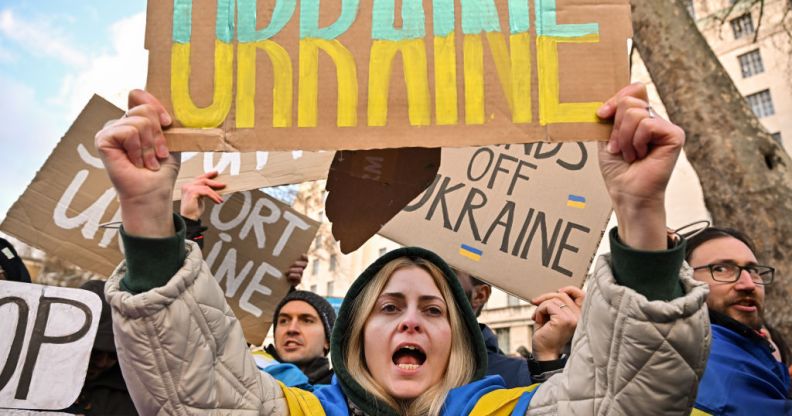
Ukrainians demonstrate outside Downing Street against the Russian invasion of Ukraine. (Jeff J Mitchell/Getty)
Franz is struggling to comprehend how it’s been 100 days since Russia invaded Ukraine, kicking off a war that has dragged on for months.
“You know, I didn’t even realise it’s been 100 days already,” Franz, who is just 18-years-old, tells PinkNews. “It doesn’t feel quite right that it’s already summer. Some part of me still expects to see snow outside the window each morning, as if it was all just February that never ended.”
Right now, Franz is in Slovakia, where he’s studying at university. He spends his days wondering where time is going – why the days seem to be slipping away from him.
“It’s like there was no spring at all,” he says. “Springs should be camera roll full of flowers, evening walks and studying frenzy. The start of summer should have been Pride marches and making plans and treasured time with friends and family in that short period of the year when everyone can finally catch a break.”
But there has been no break for the Ukrainian people. The war has raged on, with Putin refusing to relent, even in the face of fierce opposition from Ukraine.
In the 100 days since Russia invaded, an estimated 14 million Ukrainian people have fled their homes. That’s why PinkNews launched the LGBTQ+ Refugees Welcome campaign, which is raising funds for charities working with queer people fleeing the war.
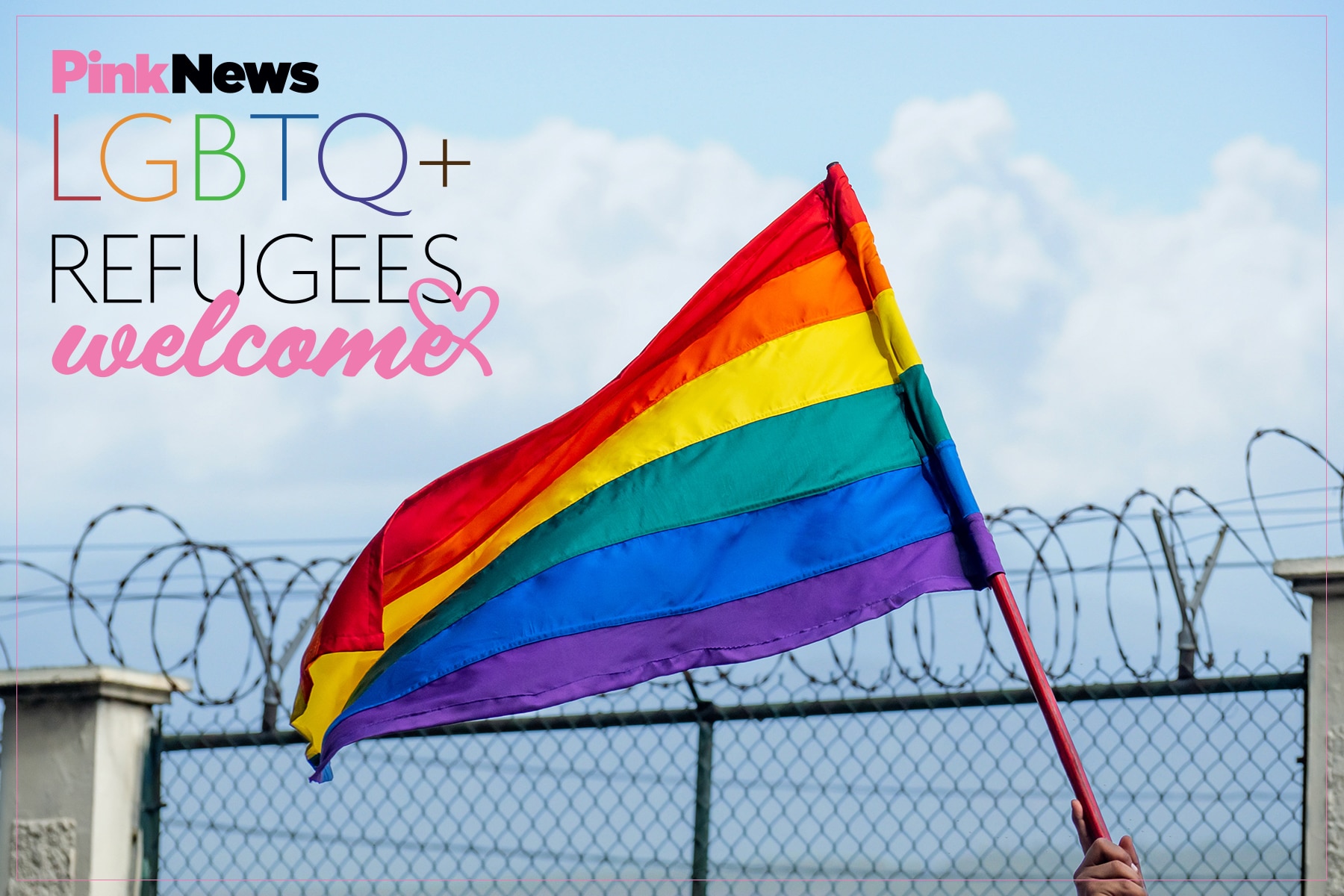
(Mario De Moya F via Getty Images) PinkNews is proud to launch our LGBTQ+ Refugees Welcome campaign to help those who need it most
The fundraiser will benefit OutRight Action International’s LGBTIQ Ukraine Emergency Fund, which is helping activists and organisations on the ground in Ukraine to support the queer community. The LGBTQ+ Refugees Welcome campaign will also benefit Micro Rainbow, an organisation that creates safe homes for LGBTQ+ asylum seekers fleeing Ukraine, Afghanistan and other countries.
As the war in Ukraine reaches the 100 days milestone, PinkNews is making a renewed appeal to those who can afford to donate even a small amount.
Old life gone forever, but each time the realisation cuts just as deep.
It’s vital that the world continues to row in behind Ukraine because people like Franz are suffering. He says his old life is “gone forever” – he has had to have terrifying conversations with his loved ones back home about the future.
“I keep worse track of the calendar than of the air raids in faraway Lviv,” Franz says. “If it wasn’t for Slovak students excitedly discussing summer plans, exams and just generally living life that feels completely impossible now, I would have probably forgotten there’s something not consumed by war.
“Meanwhile I keep staring at the date with disbelief and quiet anguish… I often catch other Ukrainian students here, in Slovakia, doing the same. Old life gone forever, but each time the realisation cuts just as deep.”
The Ukrainian students Franz is studying with in Slovakia are all desperate to get home, even though they know the war is still ongoing.
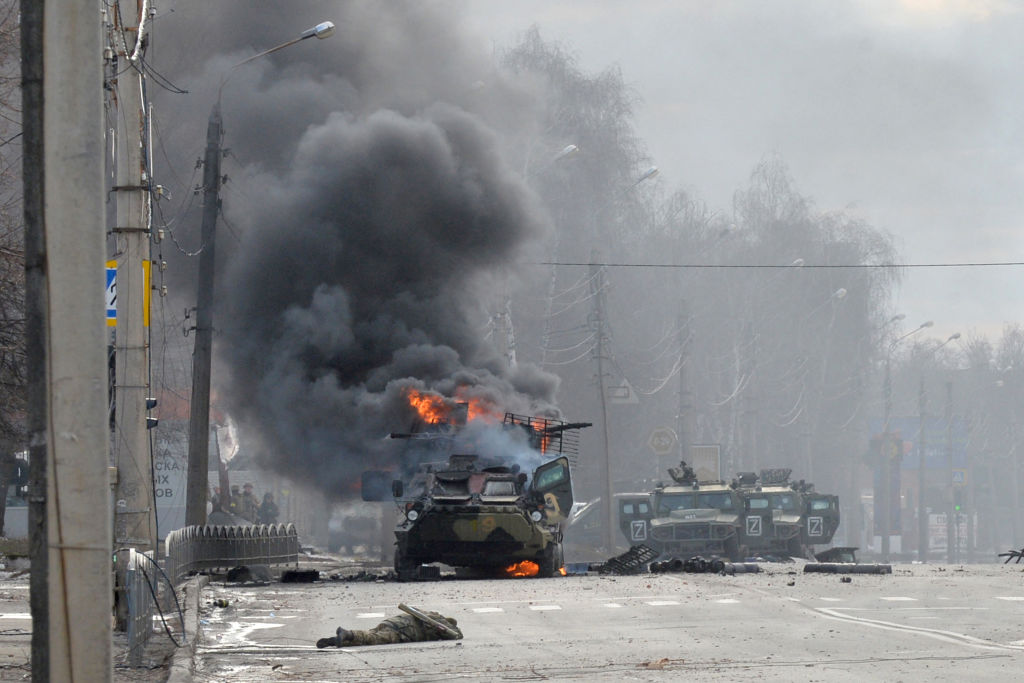
An unidentified soldier’s body lies near a burning Russian Armoured personnel carrier (APC) during fighting with the Ukrainian armed forces in Kharkiv, on February 27, 2022. (SERGEY BOBOK/AFP via Getty)
“Last week a local student from my group said he can’t wait to get home for the homemade food and some peace and quiet, lacking in student dorms. Last night, my Ukrainian roommate was nearly crying on the phone that she can’t wait to get home because if something happens to her family, she wants to die with them.”
Franz is painfully young, with his entire life ahead of him, but he has had those same conversations about death with his loved ones. Most Ukrainian people he knows have had to confront the realities of violence in ways they never thought they’d have to.
Those who have left Ukraine live in constant dread
Much of the discussion across Europe about the war has focused on the mass displacement of the Ukrainian people – but Franz points out that those who flee can’t simply move on.
“It lives in your head, it makes you twitch from loud noise, tense near helicopters and misread words. Safety feels like a lie when you know how many people are in danger, and all distance does is add anxiety that news will reach you too late.”
Recently, Franz woke up to see discussions on Twitter about a rocket that hit near his family home in Ukraine. His brother was almost hit in a similar attack just a few weeks before that.
There’s a hole in my soul in the shape of Mariupol.
“War leaves your soul riddled with countless holes, from days stolen, from panicked messages, from thousands of graves that shouldn’t exist. It still hurts to tears when it’s people you never knew.”
He continues: “There’s a hole in my soul in the shape of Mariupol, in the shape of Bucha, and the day-by-day growing holes from territories under occupation. I wonder how there’s any soul left.”
That’s why it’s so vital the world doesn’t let its focus slide away from Ukraine, Franz says. His people need Europe to continue advocating for them.
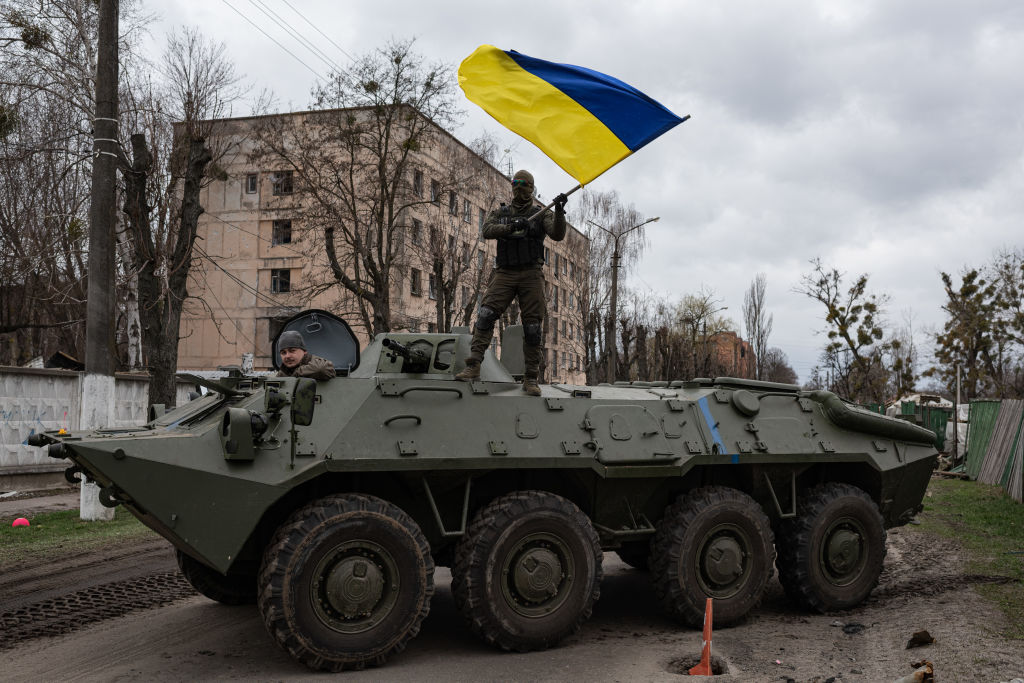
Ukrainian soldier waves Ukrainian national flag while standing on top of an armoured personnel carrier (APC) on April 8, 2022. (Alexey Furman/Getty)
“No matter how tired you are or how much you’ve already done, every day is new weapons needed, and more medicine lacking, and more homes ruined, and more people displaced,” he says.
“The weight of it is enormous for any country. Our will to defend ourselves doesn’t depend on international support, but our ability does. The price of indifference is measured in lives, and I don’t mean only politicians: even inside of Europe there are important and powerful people eager to pay that price on our behalf. If their electorate grows tired of Ukraine, the help that decides whether we survive or not will stop very quickly. Caring matters.”
Pride Month has a particular significance as the war rages on
It’s also fitting for Ukraine’s LGBTQ+ community that they’re marking 100 days of war during Pride Month. This year, the occasion has a particular significance for Franz, who is watching from afar as his queer siblings fight for freedom back home.
“LGBTQ+ soldiers and volunteers have to be twice as fearless, resourceful and strong in the face of the invasion, because there’s doubly no future for us under the Russian Empire.”
He continues: “I wish I got a cent every time someone proclaimed queer Ukrainians either don’t exist, aren’t in the army or tried to patronisingly explain what’s good for us – that would make a hefty and regular donation to the armed forces of Ukraine.
“Despite the judgement of people whose expertises consists of a skimmed Wikipedia article, I know firsthand how intimately Ukraine’s future and queer liberation are connected.”
As Pride Month gets underway, Franz is pleading with the world to show solidarity and to keep donating funds to help the Ukrainian people survive an impossibly difficult time.
“Solidarity now is the direct action to achieve the goal which, in the end, we all share: to be ourselves and to be free.”
That’s echoed by Andriy Maymulakhin, the coordinator of the LGBT Human Rights ‘Nash Svit’ Center in Kyiv. Like all Ukrainians, he too has endured hardship – he hasn’t seen his boyfriend since January, when he travelled to Lviv to help relatives on a building job.
Since then, his boyfriend has joined Ukraine’s national guard – he’s currently serving as a chef in a military division in western Ukraine.
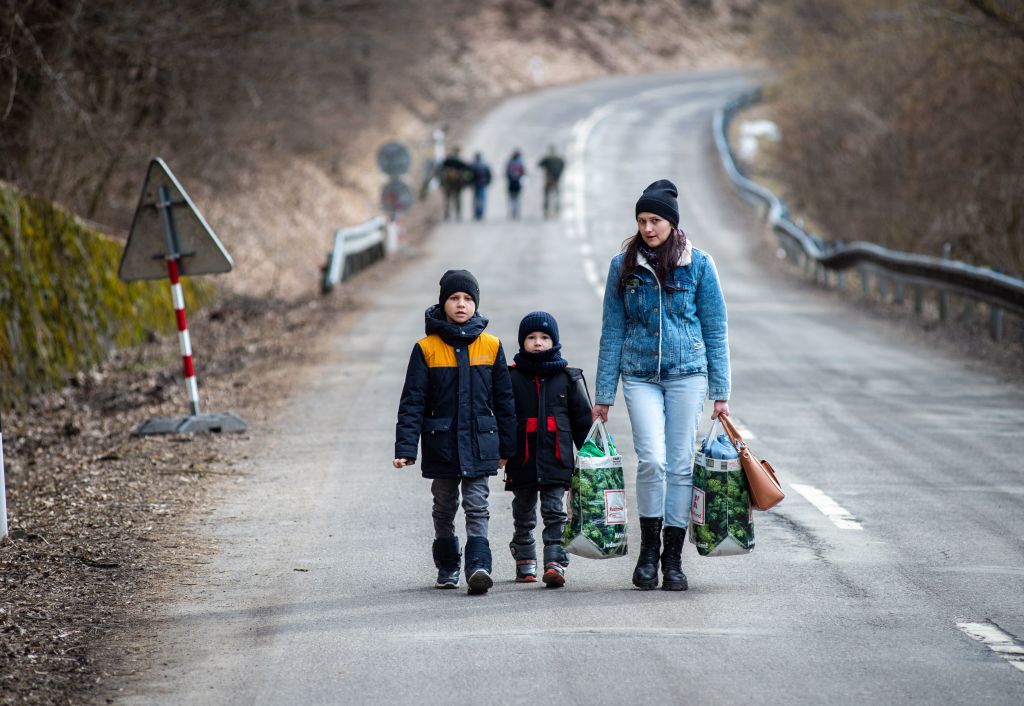
A woman with two children and carrying bags walk on a street to leave Ukraine after crossing the Slovak-Ukrainian border in Ubla, eastern Slovakia, close to the Ukrainian city of Welykyj Beresnyj, on February 25, 2022. (PETER LAZAR/AFP via Getty)
Andriy is based around 60 kilometres from Kyiv – so far, he’s been lucky. He’s managed to avoid the bulk of the violence, but he’s bee able to hear bombs in the distance, serving as a frightening reminder that the war is never too far away.
“It very much differs depending on where you are. If you’re in eastern Ukraine, then it is a terrible situation. If you’re in other parts of Ukraine, in big cities, they also could be attacked by Russian missiles, so everywhere could be dangerous.”
In the background, Andriy and his colleagues have been trying to continue the work they’re doing to support Ukraine’s LGBTQ+ community.
“Our priority is providing legal help, so we’ve tried to restart all this work. We collect information about specific problems which LGBTQ+ people have faced during this wartime.”
Andriy’s centre has also recently published the results of a survey which showed that there has been enormous change in the way Ukrainian people view the LGBTQ+ community in the last five years. The survey was conducted by an external sociological organisation.
Strikingly, the survey shows a stark drop in the number of people who feel “negatively” about the LGBTQ+ community. Andriy was “surprised” by the results – he wonders if part of that shift could be attributed to the war.
“The so-called ‘Russian world’ is explicitly homophobic,” he says. “In this situation, it could be because people are against the Russian invasion.”
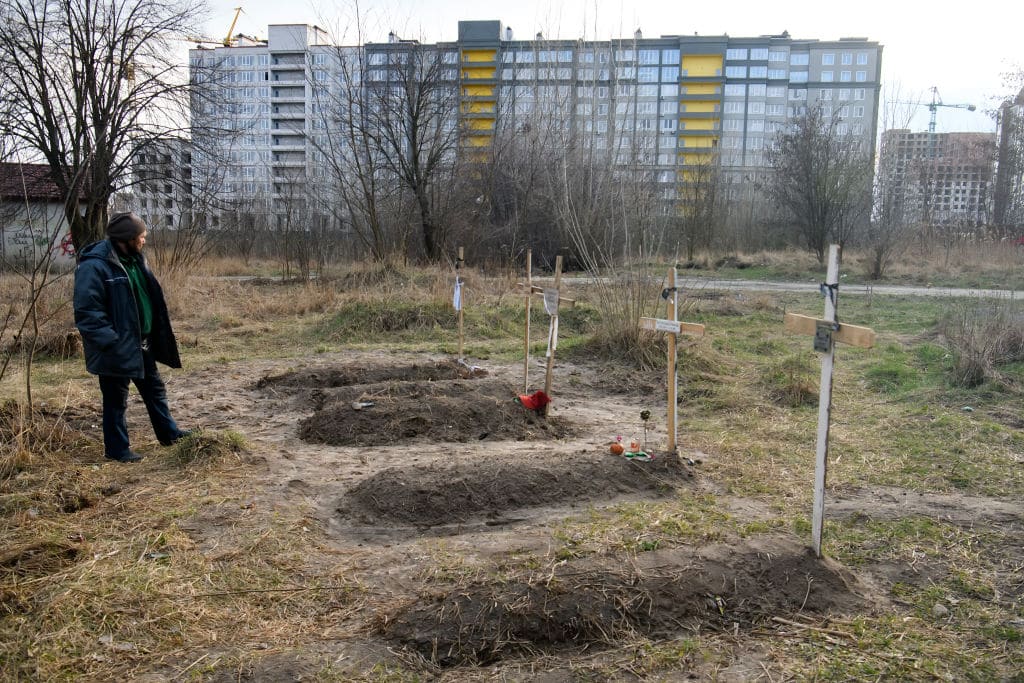
Graves with bodies of civilians next to apartments blocks in the recaptured by the Ukrainian army Bucha city near Kyiv, Ukraine, 04 April 2022. (Maxym Marusenko/NurPhoto via Getty)
He wants to make sure the world doesn’t forget about Ukraine 100 days into the war.
“It’s a moral responsibility of the western world, Europe and the United States, Canada and Australia, to support Ukraine in this fight,” Andriy says. “If possible, give us weapons to protect our land. Support our refugees – millions have left Ukraine.”
Andriy felt more optimistic about the outcome of the war back in February when Russia first invaded. As time goes by, he’s becoming increasingly afraid for the future.
“I don’t think the Russians want to stop – they want to continue this ugly war. That’s why we need the world to support Ukraine in these difficult times.”
Ukraine’s LGBTQ+ community needs your help. Please consider donating to PinkNews‘ LGBTQ+ Refugees Welcome campaign through GoFundMe, which benefits OutRight Action International’s LGBTIQ Ukraine Emergency Fund and Micro Rainbow.

